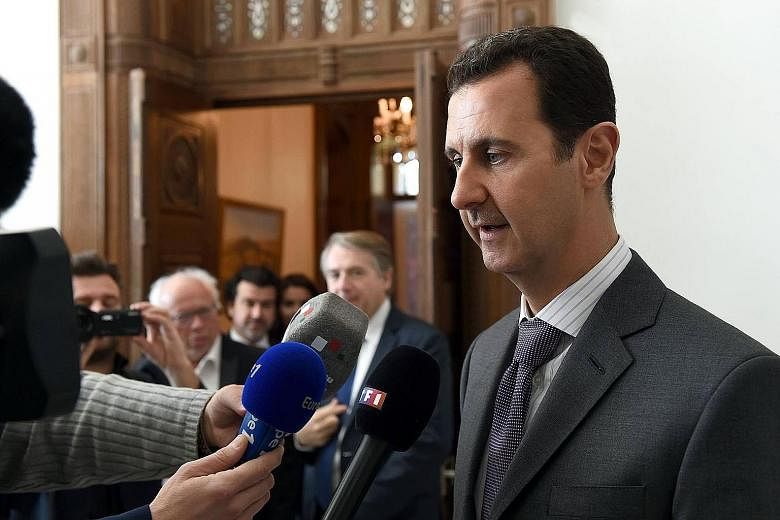Global efforts to tackle ISIS must first deal with securing peace pact in Syria: Experts
BEIRUT • The terrorist strikes in Paris have accelerated international efforts to resolve the civil war in Syria that has helped spawn the Islamic State in Iraq and Syria (ISIS), the militant group responsible for the carnage that left 130 people dead in the French capital.
Yet after more than 4-1/2 years, the obstacles to peace in Syria are the same - the biggest sticking point being the fate of President Bashar al-Assad.
The conflict began in March 2011 with peaceful protests that evolved into a civil war that has sucked in world powers. Some share broad objectives while others, like regional rivals Iran and Saudi Arabia, have conflicting interests.
Iran is mostly Shi'ite and supports Mr Assad, whose Alawite sect is an offshoot of that side of the Muslim divide. His regime has long repressed its Sunni population, inspiring domestic opposition and attracting Sunni soldiers thrown out of Iraq's military after 2003 to join the fight, often in ISIS ranks.
On the other side of the sectarian, regional contest is predominantly Sunni Saudi Arabia, backing groups seeking to bring Mr Assad down.
Russia took the United States by surprise in late September with air attacks on ISIS and other groups it called terrorists.
US President Barack Obama has complained that the targets for Russian air strikes have included Syrian opposition groups supported by Washington. He said the actions of Russian President Vladimir Putin were "directed at propping up the Assad regime".
But after the two leaders' talks on the sidelines of the Group of 20 summit in Turkey earlier this month, Mr Putin said the powers were "beginning to understand that we can only fight effectively together".
A deal among 17 nations, including Iran and Russia, which met in Vienna on Nov 14, offered a timeline for Syrian opposition groups to help draft a Constitution and elect a new government by 2017. But the Vienna agreement leaves key issues hanging, including which of hundreds of opposition groups will be included in the political process.
It cannot end the war, because ISIS, the Al-Qaeda-affiliated Nusra Front and some Islamist groups are excluded. Still, it might lead to local ceasefires between Assad forces and some rebel groups, who could then work together to fight ISIS.
Nor does the Vienna deal specify whether a new government will have full executive power, a key demand for those opposed to a role for Mr Assad in the transition.
And will Mr Assad commit to a process that could end his regime? He has always said external powers have no right to decide that issue and he will listen only to the will of his people. But in the parts of Syria he still rules - 60 per cent of the population and 25 per cent of the territory - a free vote on his future is unlikely.
Mr Assad told French magazine Valeurs Actuelles on Nov 12 that the "Constitution will bring the president and the Constitution will make him leave, through the Parliament, through elections, through a referendum, and so on".
And while the US and its allies say that Syrian military and government institutions should remain intact after Mr Assad departs, his loyalists dominate them and could destabilise any new head of state who sought to fire them.
"Assad has created the state in his image," said Professor Joshua Landis of the Centre for Middle East Studies at University of Oklahoma. "The price of a regime change will be chaos."
BLOOMBERG

